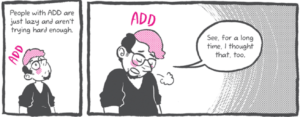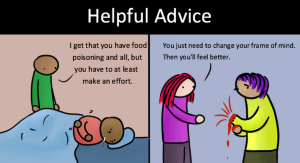
Source: Daily Record
You’ve probably thought before about the implications that feminist ideals can have on your relationships.
There’s the question of whether or not to take your partner’s last name in marriage, how to deal with your mom slut-shaming your younger sister, and how to navigate sexuality while living in a sex-negative, sexist, homophobic, cisnormative culture.
It can be especially hard to navigate when not all of our relationships exist with equally as feminist people.
Reaching feminist ideals in your relationships will likely take a lot of work and definitely a lot of communication. You might even have to say goodbye to some of your current relationships, since not everyone is willing to negotiate and therefore, tend to add toxicity to your life.
But understanding what feminist dynamics look like is the first step!
Letting Him Make All the Moves vs. Doing What You Feel
In popular culture and society, there’s this idea that even though women have made a lot of gains, they still shouldn’t be the person to initiate things in romantic or sexual relationships, particularly with men.
Women and feminine-presenting people are supposed to be the ones to be asked out, not the askers. They aren’t supposed to pay for a first date. They aren’t supposed to propose marriage.
Basically: Women and feminine-presenting people aren’t supposed to be active in relationships.
And if they are, it’s seen as foreign, and they are scolded for taking the masculinity (read: power) away from their male and masculine-presenting partner.
And there’s this myth that says that feminism is the opposite of this – that women are supposed to be in charge, that the feminine is hailed as “better” – but that’s not true either.
Feminism isn’t about female domination.
Feminism is about people of all genders being able to do the same things that straight, cis-men can do – without facing social consequences for doing so.
In a feminist relationship, the roles and dynamics should be up to you and your partner.
You should feel comfortable doing what feels natural, which will probably mean that you will sometimes initiate and they will sometimes initiate.
Handling your relationship the way that you want to (and not the way that society tells you that you should according to gender roles) is feminist.
The Double Standard vs. the Consent Standard
The double standard is nothing new. He’s a stud, she’s a slut. He’s a player, she’s a whore. What he’s doing is natural, what she’s doing is dirty.
People are well-aware that this sexist double standard exists. But many still seem to justify it (that’s just the way things are, ya know?). And we keep slut-shaming girls for exploring their sexualities while giving boys kudos for the same.
Feminism calls for all genders to be able to express their sexualities and have sex the way that they please, as long as consent is always present (and able to be given).
It’s really that simple.
Parents Use Authority vs. Parents Reject Oppressive Hierarchy
There’s this idea that parents are the rulers of their offspring (even after they become adults or are close to it) and that that’s the natural order of society.
We hold this belief, culturally, that children will go their own way if their parents don’t properly guide them.
We believe that children are immature and completely incapable of making their own decisions before they graduate from college and that it’s your responsibility to complete your parental duties of making sure that they understand that nothing “bad” will happen under your roof.
But this type of parent/child relationship is based on fear and not mutual respect.
It doesn’t allow for collaboration or compromise, which are skills that children need to learn in order to develop healthy relationships.
And because children need to be respected as autonomous, self-directed individuals with their own opinions, desires, and ideas, we need to model this for them from the start.
Of course, that doesn’t mean that parents should let children do whatever they want, but rather, that that they should listen and respect their children’s opinions like they would anyone else.
Parents often tell their children how to feel instead of listening to find out. Doesn’t this kind of sound like a pattern we see repeat in many other types of relationships we have throughout our lives?
That’s why it’s so important that we let our children know that they deserve respect by giving it to them.
Backstabbing vs. Self-Respect
Friendships, especially among women, are talked about as dramatic and full of cattiness.
Many women even believe women cannot be true friends.
From a very young age, girls are taught that others girls are competition and that there are only a limited amount of spaces in the sphere of being pretty, desirable, smart, and strong – and that you have to be all of those things.
Girls are told that other girls are standing in their way of finding a boyfriend and that you have to compete for guys’ attention. If you’re not the hottest, you’re going to lose and be miserable and alone.
Similarly, they’re also told that other popular girls are standing in their way of being popular, that only a certain number of girls can ever achieve that social approval, and that you’ve got to compete for that spot.
This model of behavior causes girls to act in relationally aggressive ways towards one another.
Part of socially constructed femininity is being coy and indirect, and so girls often act passive-aggressively towards one another and avoid direct confrontation.
These feelings of being in competition continue into adulthood.
This model of behavior is even encouraged and sold to us as a pseudo power trip. In fact, shows like The Real Housewives thrive on this relational aggression.
Feminism says that these ideas about friendship between women are based in sexism.
Feminism says that by devaluing other women and focusing on “winning” among the boys, we’re acknowledging that there really is only room for one woman at the top.
We hold stereotypes about other women and despise them for no reason other than our own insecurities.
Feminism believes in the power of friendship.
It calls for women to love, mentor, guide, help, and empower one another.
Feminism sees women as being powerful, strong, and smart. Feminism sees friendships between women as being potential forces for global change.
Think of the friendships of Elizabeth Cady Stanton and Susan B. Anthony, Vanessa Valenti and Courtney Martin, and bell hooks and Melissa-Harris Perry. These friendships have been behind a lot of social change and feminist power.
***
If you take away one thing from this analysis of the anti-feminist social norms our society holds about relationships, remember this: You are in control of your relationships.
You have the power to end them, start them, cultivate, and enrich them.
How you chose to relate to and with others is completely up to you.
The ultimate feminist act is to practice this.
And anyone who tries to tell you otherwise is still working within the framework of societal approval.
[do_widget id=”text-101″]
Erin McKelle is a Contributing Writer for Everyday Feminism. She’s an e-activist, video blogger, student, and non-profit advocate and has launched several projects including Fearless Feminism and Consent is Sexy. In her spare time, Erin enjoys reading, writing bad poetry, drawing, politics and reality TV. You can find her blogging at Fearless Feminism, Facts About Feminism, and Period Positive. Follow her on Twitter @ErinMckelle and read her articles here.
Search our 3000+ articles!
Read our articles about:
Our online racial justice training
Used by hundreds of universities, non-profits, and businesses.
Click to learn more




















